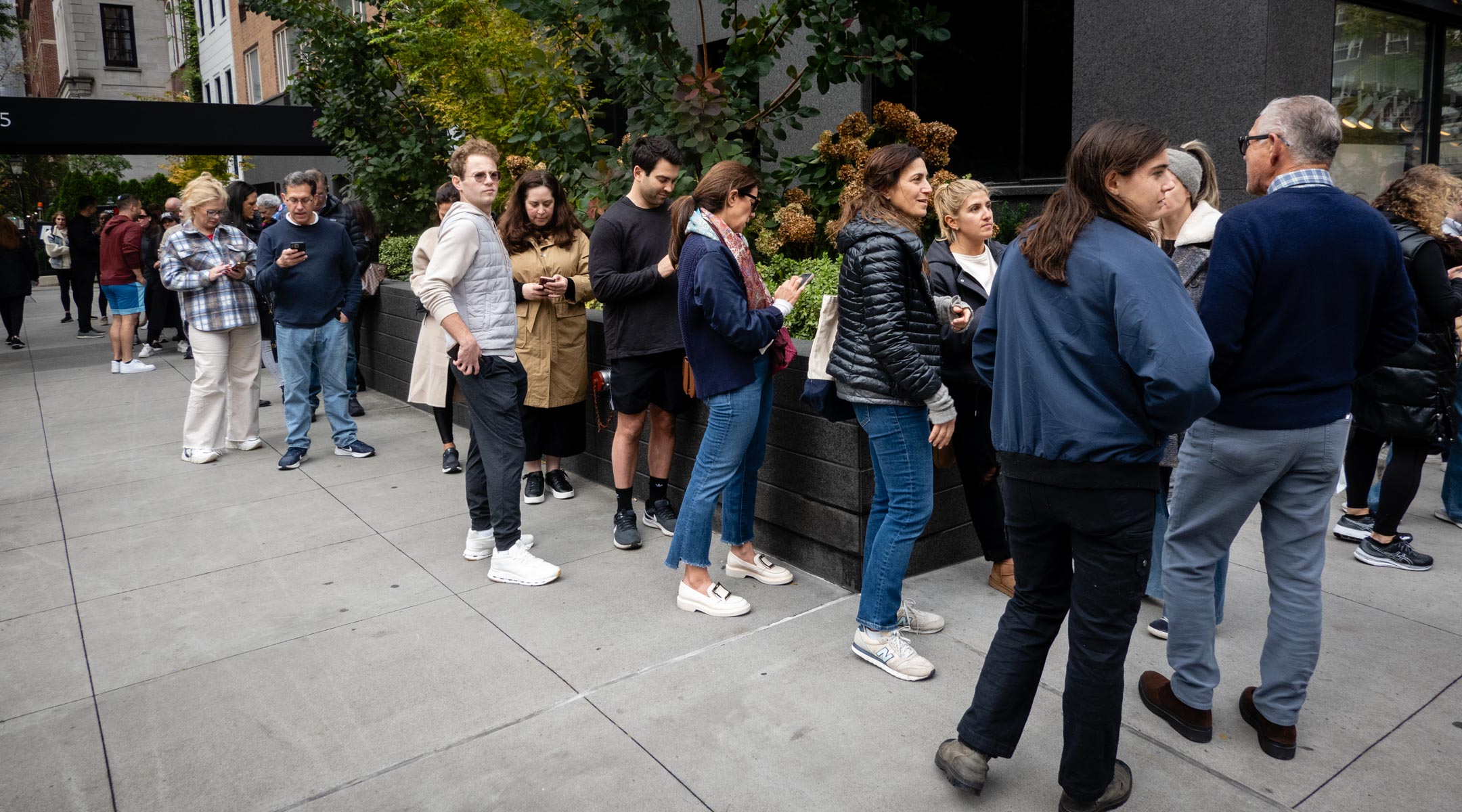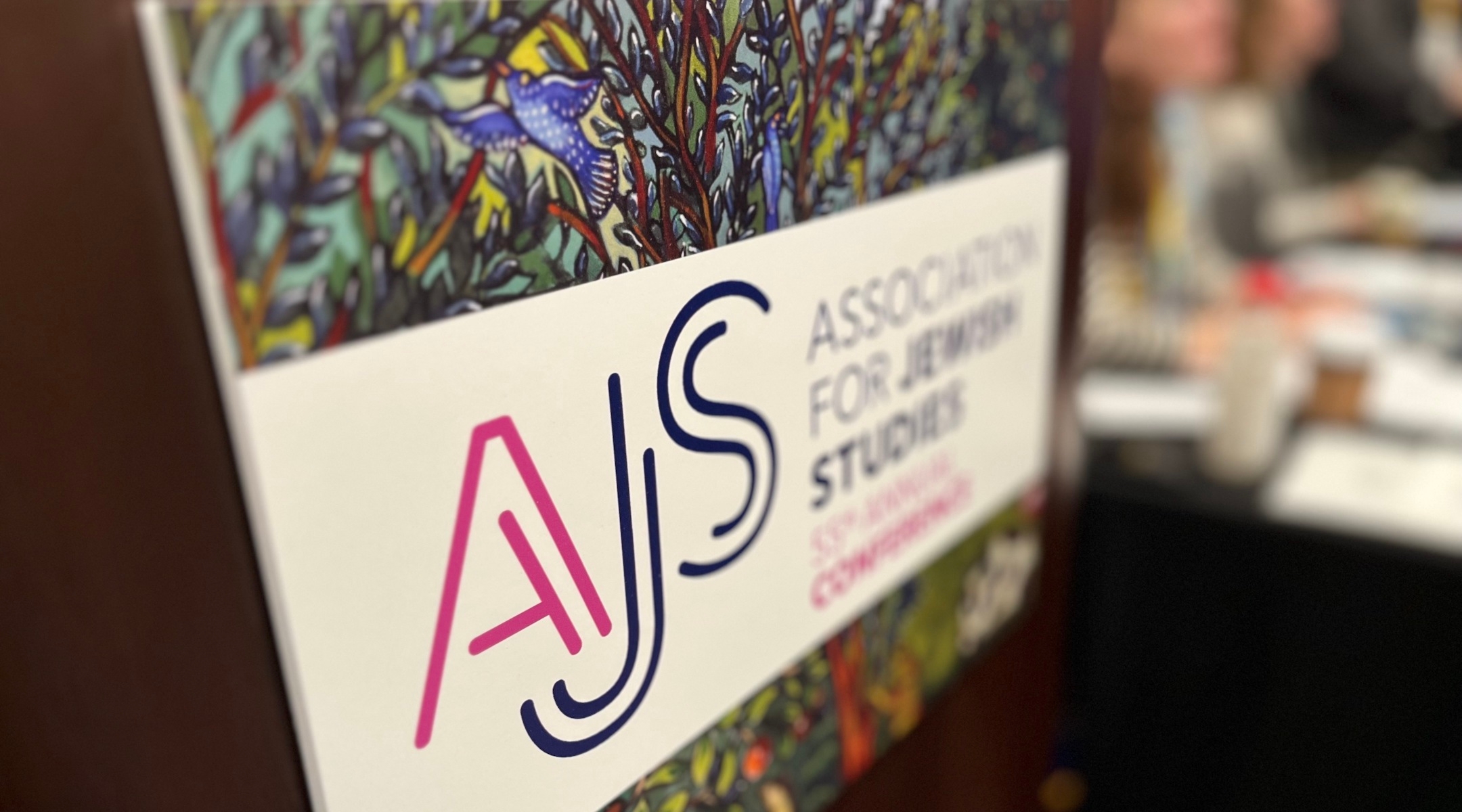SAN FRANCISCO (JTA) — Did a New York City coffee shop’s workers quit over the owner’s pro-Israel stance? Was the library at Cooper Union barricaded to protect Jewish students inside from an angry pro-Palestinian mob?
Ten weeks into the Israel-Hamas war, these are the kinds of stories fueling angry debate on social media, with Jews charging bigotry and critics of Israel saying antisemitism is being weaponized to silence them.
These weren’t the kinds of events being debated — at least formally — at the 55th annual convention of the Association for Jewish Studies, held this week in San Francisco. Some 1,000 scholars gathered to network and share their latest research, which in the case of historians, Bible scholars and philosophers tends to look backwards, sometimes by centuries.
But the war weighed heavily during the conference, turning historical issues into debates very much of the moment. A presenter would be discussing, say, Jewish attitudes about contraception in the 1950s and be asked why Jewish concerns about safety are ignored by campus Diversity, Equity and Inclusion programs. At a session on what it’s like to be one of the few Jewish studies scholars at small or Christian colleges, panelists commiserated about being expected to speak for all Jews about the turmoil in the Middle East.
At one session — it had the seemingly uncontroversial title “Hurdles in the Archive: Pinpointing Antisemitism” — the moderator even warned that the panelists would be discussing the challenges of researching historical antisemitism in various archives, not current events. “So although we are, all of us, very conscious of issues around antisemitism now,” said Deborah Dash Moore, the acclaimed historian at the University of Michigan, “this is looking back.”
Good luck with that. Even discussing antisemitism in the mid-20th century, the presenters were foreshadowing the current discourse around events like those at the coffee shop and Cooper Union. Who gets to define antisemitism? If Jews call it antisemitism, must you believe them?
Riv-Ellen Prell, like Moore a force in Jewish studies for the last four decades, described her research at the University of Minnesota into an incident of alleged antisemitism at the dental school in the late 1930s. Three Jewish women in the dental hygiene program were told by an administrator — “for their own good,” according to the archive — that the school couldn’t guarantee them jobs once they graduated because many dentists wouldn’t hire Jews. The women took this as an unsubtle hint to quit, and a local Jewish newspaper editorialized against a “system set against Jews.”
In 2019, when the university was thinking about renaming buildings named after alleged segregationists and antisemites, a regent said Prell’s interpretation of the documents unfairly tagged the dental school as antisemitic. The regent insisted that the dental program administrator was a product of her time, thought she was being helpful, and wasn’t a Nazi or a member of the Ku Klux Klan.
This exasperated Prell, who said it’s a historian’s job to read primary documents and interpret them in context.
“Various administrators at the university believed they were entirely innocent of anti-Jewish behavior,” she said. “They believe that all Jews they encountered were grateful to them.”

Customers line up outside Caffe Aronne in the Upper East Side after reports that the staff members quit due to the store’s pro-Israel activities, Nov. 7, 2023. (Luke Tress)
Ari Kelman, of the Stanford Graduate School of Education, was similarly asked to comb the university’s archives for evidence of anti-Jewish discrimination in the 1950s. There was a document quoting an administrator who was worried that if the school weren’t careful, there would be a “flood of Jewish students” from two heavily Jewish high schools in Los Angeles, Fairfax High and Beverley Hills High. But did Stanford ever act on his bias, the way the Ivies once imposed quotas on Jewish students?
Kelman’s archive search came up empty until he found a tally of high schools represented at Stanford in the years after the administrator’s remarks. Sure enough, enrollments from the two “Jewish” high schools dropped dramatically. The university ultimately apologized for discriminating against Jewish students.
Kelman called the tally a “smoking gun,” but one that only made sense in — here’s that word again — “context.”
“How do you identify antisemitism when you see it, especially when it doesn’t look like Brown Shirts [Nazi paramilitary], or nobody’s using the language of ‘communists’ or other sort of coded terms for Jews?” he asked. “How do you know what it looks like?”
Brittany P. Tevis, a postdoctoral fellow at the Institute for Israel and Jewish Studies at Columbia University, said that rather than asking whether something is antisemitic, it may be more useful to ask “whether or not Jews’ rights have been infringed upon. Because unlike a metaphysical concept, like antisemitism, rights are definable and they have been legally defined.”
Tevis, who will soon offer what Moore called the first course about anti-Jewish discrimination and the American legal system to be taught in an American law school, described her research into a workplace discrimination claim in 1940s Massachusetts. Although the evidence of antisemitism is “murky,” she, like Prell and Kelman, defended the historian’s right to name antisemitism when they see it.
Which brings us to the café and Cooper Union cases. In both incidents, initial reports suggested pretty clear cut instances of antisemitism, or anti-Zionism bordering on Jew hatred. In the case of the café, the Israeli owner reported that his pro-Palestinian employees quit and, according to his lawyer, tried to “force it to close in retaliation for proudly displaying the Israeli flag.” When word of the incident got out, supporters flooded the place.
But a New York Times followup suggested the story was more complicated: Workers complained that they hadn’t signed up for the owner’s pro-Israel activism at a fraught time, and some of the workers, especially the women, were uncomfortable when some customers began questioning the café’s pro-Israel stance. They denied they were antisemitic.
The Times also dug into viral allegations surrounding an Oct. 25 incident at Cooper Union’s campus in Manhattan. Initial reports, and a six-second video, suggested that Jewish students were trapped in a school library by pro-Palestinian demonstrators chanting, “Free, free Palestine.” The Jewish students said they felt threatened, although campus police said they were on the scene and saw no cause to intervene. A protester said, “in no way was this an attack on Jewish people.”
It’s hard to know how historians will describe these incidents in decades to come, especially when they remain murky in the moment. Should people “believe Jews” when they say they feel threatened as Jews? Is anti-Zionism antisemitism — and do such distinctions matter when protesters are pounding on a library door? “At no time were they yelling out that they wanted to kill people,” the Cooper Union Police Department later said of the library protesters. A fair distinction, or a pretty low bar?
In her response to the AJS panelists, Lila Corwin Berman of Temple University gingerly suggested that historians can go too far in finding evidence of antisemitism when other explanations might suffice. “Sometimes I feel like when there’s a desire to name a very particular force and determine that this is what was happening, there tends to be a politics of not wanting to ask some of the more interrogating questions,” she said — for example, what were the Jews’ motivations in reporting these incidents as antisemitism, and what are the motivations of institutions that commission historians to investigate their archives.
“I get that,” Prell later replied. “But what complicates that is [the question], how do you analyze power?”
In her presentation, Prell said she is interested in the policies and processes that prevent people from holding those in authority responsible for antisemitism.
”Our moment demands that we insist that without understanding the mechanisms and lived experience of racism and antisemitism, no document, whatever it states, will ever speak for itself,” she said. “Archives will otherwise be repositories for historical evidence to be dismissed, minimized and ridiculed as falling short of the elusive definition of, in this case, antisemitism.”
JTA has documented Jewish history in real-time for over a century. Keep our journalism strong by joining us in supporting independent, award-winning reporting.







